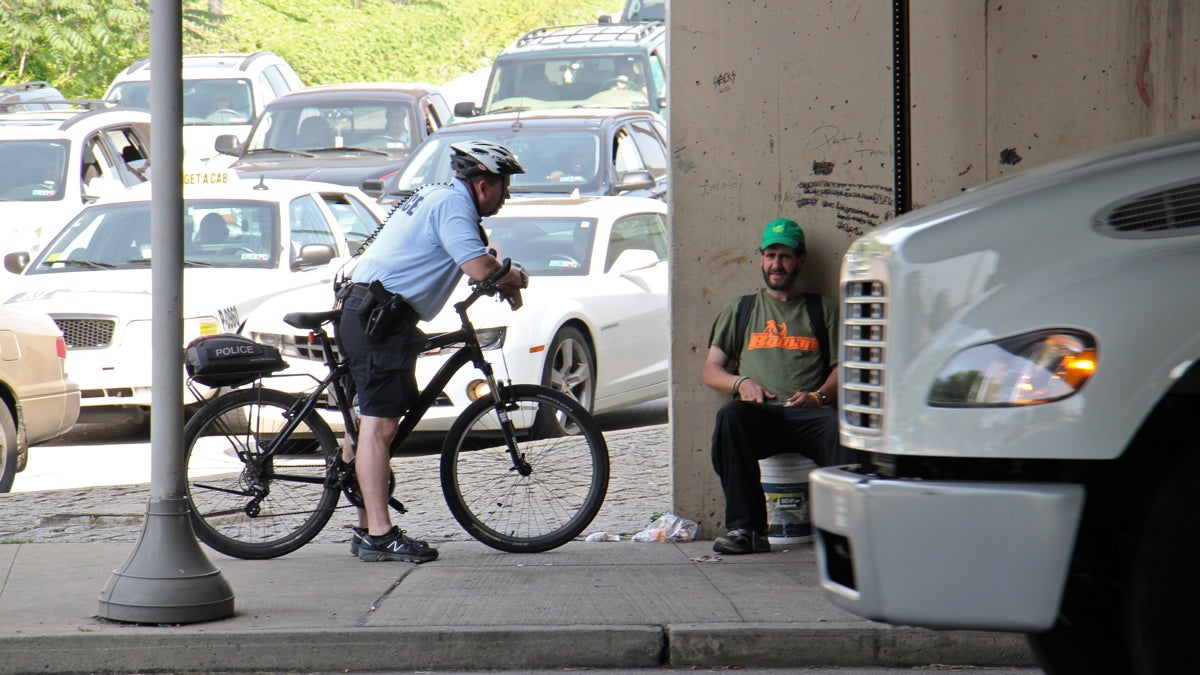Begging for mercy: Philly panhandlers say citations are ‘pointless’

A Philadelphia police officer stops at the I-676 off ramp to Sixth Street to remind a panhandler of an upcoming court date. Officer Downey issued the summons for obstructing traffic a year ago. If the man doesn't show up in court, an arrest warrant will be issued. (Emma Lee/WHYY)
Stephen Stackhouse has so little money that he spends every morning walking between commuters’ cars coming off the Vine Street Expressway in Center City, carrying a well-worn cardboard sign with a straightforward message: “HOMELESS N HUNGRY.”
A few hours of begging might put $30 in his pocket, enough to get him through the day.
But that time also is just as likely to land him in jail.
In the past four years, Stackhouse, 32, has been arrested 17 times while panhandling, racking up $4,740 in fines, none of which he has paid. Offenders who consistently ignore court-ordered fines risk an arrest warrant, even though obstructing the highway is a summary offense, the least serious of crimes. Stackhouse said he once spent 23 days in jail on such a warrant, waiting to be called to court, where the judge freed him after reducing his fines.
If it seems pointless to criminally charge and fine someone so poor they have to implore passers-by for spare change, it’s also legally questionable.
“Soliciting a charitable donation, whether you’re from the United Way or the Salvation Army or a poor person in need, is constitutionally protected,” said attorney Paul Messing, who along with the American Civil Liberties Union sued the city on panhandlers’ behalf and won in 1999. “It is a First Amendment right to speak and request funds; panhandling is not a crime.”
Yet just ask any panhandler: Philadelphia police routinely cite them with obstructing the highway. Timothy Teschko, 36, has gotten 31 citations since 2013, adding up to $2,253 in fines. John Morris, 50, has 20 since 2010, with $4,283 in fines. Raymond Rainey, 55, has 19 since 2009, with $2,518 in fines.
Thomas Petrusky, 35, has been cited 10 times in the past five weeks alone. His cases remain pending, with no fines yet levied.
“They end up building up,” Teschko said of the citations. “I just see it as pointless because there’s so many other stuff going on, and they’re wasting time like bothering, like writing tickets and sending people to court that are asking for money. They’re (panhandlers) not out here robbing people … I’m standing on the side of the road. People can drive by me whether they want or not. I’m not bothering them.”
Most ignore the tickets, saying they can’t pay. The citations aren’t much of a deterrent either, as many panhandlers simply switch corners. And many are heroin addicts, driven to beg by their drug dependency.
And some say panhandling can be lucrative.
“It’s not a good day unless I get $100 to $200,” said one panhandler who declined to give his name because he didn’t want to become a police target. That man, who said his heroin addiction landed him on the street, has been begging long enough that he knows who’s more likely to give (black women) and what makes donors give more (a panhandler with a disability, or eye contact between panhandler and passer-by).
This is the rare instance where advocates in the homeless community wish people would be less generous.
“Money is not always the best intervention,” said Carol Thomas, director of homeless services for Project HOME. “If someone is suffering from substance abuse, it’s only going to go to feed that addiction. It’s better to offer to buy the person a meal rather than giving money. Or call social services.”
No matter how much a panhandler pockets, this is a problem that promises to grow, as the weather warms and more panhandlers hit the street, advocates agree.
Safety issue or social ill?
It’s hard to argue that cops shouldn’t clear panhandlers off streets where a driver could plow them over – or swerve to avoid them and hit someone or something else.
Still, some panhandlers say cops often cite them even when they’re standing on berms or sidewalks.
And citations shouldn’t be the city’s strategy, civil-rights and homeless advocates agree.
“If you’re standing in the middle of the street, causing a danger to yourself or motorists, the police certainly can intervene,” Messing said. “But the intervention should be the police summoning outreach services and trying to get the person to a safe place, not issuing a citation. Arresting somebody because they’re poor and issuing them a fine obviously makes very little sense, because they’re not in a position to pay the fine, and it’s a waste of police and court-related resources to take that approach. This is a social service problem and should be treated as such.”
Police Capt. Francis Healy actually agrees with that sentiment.
“Some people have mental health, substance abuse and other issues that influence their behavior. Enforcement actions aren’t going to be the solution for a lot of our social ills,” said Healy, who serves as adviser to Philadelphia Police Commissioner Richard Ross.
Two potential solutions are in the works.
The first is rooted in the $3.5 million MacArthur Foundation grant the city received in April to reduce its swollen prison population. One chief goal: Diverting low-level offenders — like panhandlers and others charged with summary offenses — to homeless shelters, drug-rehab programs and other social-service providers.
If that sounds familiar, that’s because it’s a strategy oft-touted in talks about criminal-justice reform. But it’s a promise that can be tough to uphold, considering that many programs are in such high demand they have waiting lists.
Healy would make the strategy official, though, and give officers the power to drive offenders to social service agencies themselves, rather than simply call outreach workers to come.
The second potential solution arose out of the marijuana decriminalization law.
Possessing a small amount of marijuana was a misdemeanor whose gravity got reduced to a city-code violation when the law took effect in October 2014. That change meant summary offenses, which had been the least serious crimes, now are penalized more harshly than minor pot possession.
To fix that, City Council is considering a bill that will decriminalize summary offenses like obstructing the highway, disorderly conduct and failure to disperse and make them city-code violations, just as minor pot possession now is.
“We are really striving to build trust in the community,” Healy said. “You have to be fair, and this is an effort by us to enforce things in a fair consistent manner.”
The bill — expected to pass in June — could divert 10,000 incidents a year out of the clogged criminal justice system, said Julie Wertheimer, chief of staff for Benjamin Lerner, deputy managing director of criminal justice.
While helping panhandlers wasn’t the intent of the law, it will be a consequence, Healy added. Another unintended benefit: Police should be able to avoid arresting nonviolent protesters during the Democratic National Convention in July, Wertheimer said.
As a city code violation, an offense doesn’t go on the offender’s criminal record, and it wouldn’t result in an arrest warrant or jail time — all of which represent barriers for poor people trying to break the cycle of poverty and homelessness.
It would, though, still carry fines.
And fines never go away.
After two years of nonpayment, the court sics a collection agency on the fine-flouter, said Marty O’Rourke, a spokesman for the First Judicial District.
And if an offender can’t pay?
“They remain on the books until the person dies,” said O’Rourke, adding that if an offender dies with assets or establishes an estate, officials will try to recover delinquent fines from there.
There’s currently $533.1 million in unpaid criminal fines in Philadelphia, he said.
That policy demands reform, at least when it comes to poor people, Messing said.
“Once the transition to civil-code violations goes into effect, we’ll take a look at the issue of whether these fines might have any consequences for the homeless, and we’re confident we’ll be able to amicably resolve that with city officials,” he said.
In the meantime, one advocate in the homeless community had another suggestion for city officials grappling with this issue.
“Most of our shelters or drop-in centers kick people out during the day,” said Marsha Cohen, executive director of the Homeless Advocacy Project. “There needs to be a place for people to go.”
WHYY is your source for fact-based, in-depth journalism and information. As a nonprofit organization, we rely on financial support from readers like you. Please give today.




